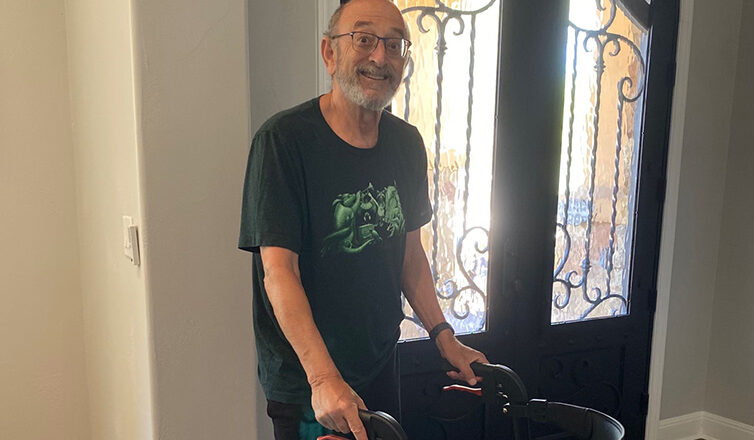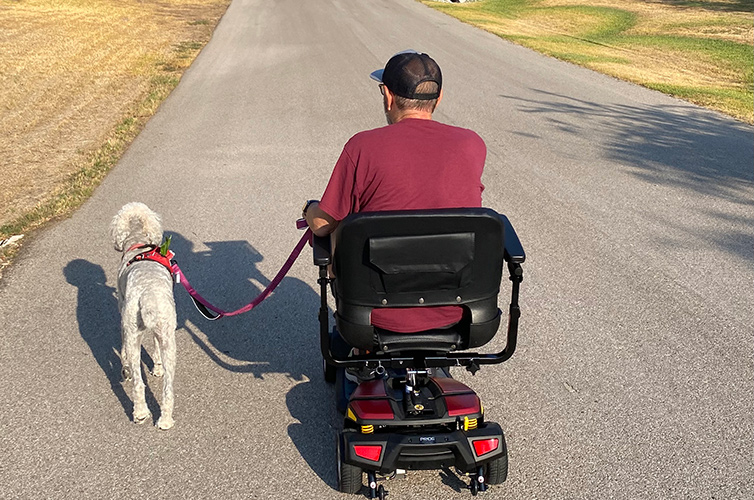71-year-old David Rothschild has seen a lot of illness and disease in his life, but he never imagined he would be the one battling amyotrophic lateral sclerosis, or ALS, a progressive disease that attacks the nerve cells responsible for controlling voluntary muscles. Rothschild was an Internal Medicine physician for nearly four decades in the Houston area.
“I only saw one or two patients in all my years practicing medicine who were eventually diagnosed with ALS,” said Rothschild. “You never think something so rare is going to affect you, and now it affects virtually every step I take.”
Getting an ALS Diagnosis
For Mother’s Day in 2021, David had purchased his wife a hammock. After hanging it, he sat on it and fell backward, hitting his head. He suffered a concussion and a brain bleed, and the traumatic brain injury required brain surgery for a subdural bleed. That was the first of several falls he experienced in the months ahead. He started having increasing trouble with his balance. He saw two neurologists who did multiple tests but simply diagnosed him with a weak left leg and a left foot drop.
In the summer of 2021, David was in Colorado doing what he loves most – fishing. He slipped on river rocks and fell onto the front of his head. Over the next several months, he continued to struggle with his balance, could no longer run, and had a difficult time using the steps to get into his backyard swimming pool. His leg muscles kept getting harder to control over the next year until October 2022, when he fractured his foot, saw another neurologist, and was diagnosed with ALS.
“I was blown away by the diagnosis,” said Rothschild. “Even though I knew my muscles were declining and something wasn’t right, hearing I have ALS was devastating to me and my family. The neurologist told me and my wife that I would likely only live for a couple of years. She didn’t offer any hope.”
David was referred to neuromuscular neurologist Dr. Yessar Hussain who keeps track of his functionality and provides education. David will soon start monthly visits to our ALS Clinic, where he’ll get comprehensive, holistic care for ALS patients.
“We want to make it easy for ALS patients to find all of the support they need in one place,” said Dr. Hussain. “The clinic providers work with patients and their families on quality of life.”
“One of the toughest parts of having ALS is that no one knows how to treat it, ” said Rothschild. “I’ve tried two very expensive medicines and take many vitamins. I’ve tried acupuncture, physical therapy, and swimming for strength.”
Daily Life with ALS
David’s life is much slower than it was just one year ago. He takes his dogs for a walk almost daily while riding his scooter. Recently, he traveled to California with his family to escape the Texas heat. He loved seeing and hearing the ocean water but struggled to navigate the sandy beach safely using his walker. He also wears a brace on his lower left leg to keep his foot level. David has not been able to go fishing for months, which he misses terribly. He is fully aware of how many simple pleasures and daily activities have become challenging and overwhelming.
“Every step is dangerous for me,” said Rothschild. “It’s hard for me to sleep. Even something as mundane as rolling over in bed is difficult. I’ve learned we should never take the simple things for granted.”
David also feels strongly that spouses, family members, and other caregivers of ALS patients should be cared for themselves. He says it is normal for people to ask how the patient is doing, but he reminds everyone to check on the caregivers’ mental and physical health as well. He is extremely grateful for the support of his wife and family but knows they need to be wrapped in support on many levels.
Looking for Hope and Purpose
David says the hardest part of ALS is finding ways to remain hopeful. He sets goals for when he will see his four grandchildren again. He also has his sights set on taking part in the Walk to Defeat ALS in Austin in October along with his family. It gives him something to look forward to with the hope of raising awareness and money for ALS research.
“When you have ALS, you need hope and a purpose,” said Rothschild. “I am hopeful funds raised at the Walk to Defeat ALS will help cure it altogether one day. I have a purpose to take part when I know someone in the future may not have to live with this horrible condition.”
We are currently enrolling patients in clinical trials for ALS and other neuromuscular diseases at our research department, the National Neuromuscular Research Institute. Learn more about our clinical trials here or call us at (512) 920-0140. And follow us on Facebook, LinkedIn, Twitter, and Instagram for important updates.

